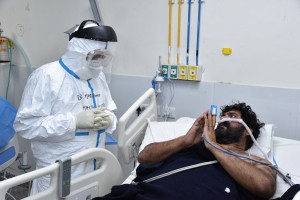
Global decline in cases and deaths from COVID-19 for the second week in a row
Geneva: The World Health Organisation (WHO) Director-General Dr. Tedros Adhanom Ghebreyesus today said there was a huge disconnect growing where in some countries with the highest vaccination rates, there appears to be a mindset that the pandemic is over, while others are experiencing huge waves of infection. “The pandemic is a long way from over,” he declared.
“The situation in a number of countries continues to be very concerning. The pandemic is a long way from over, and it will not be over anywhere until it’s over everywhere,” Dr. Ghebreyesus said amidst WHO figures that showed that for the second week in a row there has been a global decline in cases and deaths from COVID-19.
Even some places that have previously done very well at containing COVID-19 are seeing dramatic increases in cases, hospitalisations and deaths. New variants of concern, fragile health systems, reduced implementation of public health measures and supply shortages of oxygen, dexamethasone and vaccines are all compounding the current situation.
Dr. Ghebreyesus said WHO had been responding to the surge in cases in India and other hotspots. “Demand is currently so high that WHO needs immediate funding in order to sustain its technical and operational support to all countries – especially the most affected – involved in the present wave,” he said. He added that while in 2020, donors very generously contributed to the Strategic Preparedness and Response Plan, in 2021, the current response plan was underfunded and the vast majority of that was ring fenced by donors for specific countries or activities.
“This is constraining WHO’s ability to provide an adaptable and scalable response in emerging hotspots. WHO requires urgent funding to the current response plan, which would allow us to scale up support for countries and support the ACT Accelerator, he said, adding that “flexibility of that finance is key, not just so that we can respond quickly to the emergency needs in several countries including Nepal, but that we can work to save lives and livelihoods wherever it is most needed in a rapidly evolving situation”.
The surge in cases has compromised global vaccine supply and there is already a shortfall of 190 million doses to COVAX by the end of June. COVAX works and has so far delivered 65 million doses to 124 countries and economies but it is dependent on countries and manufacturers honouring their commitments.
The WHO D-G called on COVID-19 vaccine manufacturers to publicly commit to helping any country that wants to share their vaccines with COVAX to lift contractual barriers within days not months. “We also need manufacturers to give the right of first refusal to COVAX on any additional dose capacity,” he said.
“I want to reiterate the statement that was released by Unicef overnight, which outlines the huge shortfall in vaccine supply to COVAX,” he stressed.
He appreciated AstraZeneca, “which has been steadily increasing the speed and volume of its deliveries”, and also referred to Pfizer’s commitment to providing 40 million doses of vaccines with COVAX this year. However, he pointed out that the majority of Pfizer vaccines would be in the second half of 2021. “We need doses right now and I call on them to bring forward deliveries as soon as possible,” he said.
The D-G further informed that COVAX partners were in discussion with Johnson & Johnson to receive doses in the second half of 2021. “But this has not been finalised and we do not know when they will arrive,” he said. Moreover, he said while Moderna too had signed a deal for 500 million doses with COVAX, the majority had been promised only for 2022. “We need Moderna to bring hundreds of millions of these forward into 2021 due to the acute moment of this pandemic,” he said. He further added: “Once the devastating outbreak in India recedes, we also need the Serum Institute of India to get back on track and catch up on its delivery commitments to COVAX.”
– global bihari bureau





